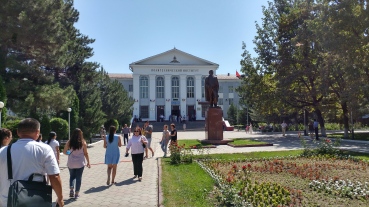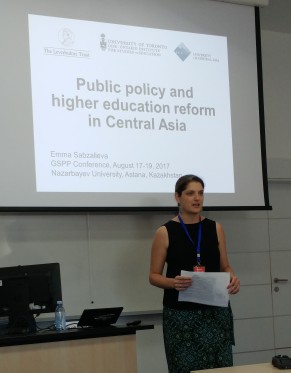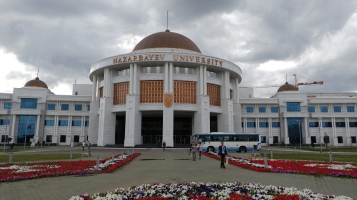It’s been rather quiet on the blog of late.

Don’t worry – I haven’t run out of ideas to keep the blog going. On the contrary, I probably now have too many. I also have a LOT of new photos of universities to add to my photo gallery (see the bottom right part of the homepage). Bet you can’t wait for that!
The reason for the lower than usual level of activity is that I’ve been doing fieldwork for my PhD thesis over the last two months.
This has involved meeting with over 30 wonderful academics in Kazakhstan, Kyrgyzstan and Tajikistan and spending a time with each of them discussing their personal experiences of working in higher education since the late Soviet period.
I have learned so much from my respondents and am incredibly grateful to each of them, not just for their time, but also for their willingness to share their own stories with me. Once I am back in Canada next month, I will need to spend time reflecting on these interviews and making sure I do justice to the rich data I have been able to gather.
All the interviews have been anonymised so I can’t thank people publicly – but they know who they are. Thank you. Спасибо.
In addition to doing these interviews, I’ve also been selected to present at three conferences, one in each country.
At the joint ESCAS-CESS conference in Bishkek, Kyrgyzstan in June, I organized a panel on The shifting landscapes of post-Soviet higher education, presenting the paper Conceptualizing change in post-Soviet higher education. I also convened a roundtable on to discuss the future for higher education in the post-Soviet space. Read more about the conference here.
In July, I was invited to present at a conference on Tradition and change in a contemporary world in Dushanbe, Tajikistan. This is a very fitting theme for my thesis work on change (and stability), although at the request of the conference organizer, the paper I presented drew on my earlier comparative work on the UK and Canada and was entitled Connecting history with contemporary identity in higher education. The article that this paper is based on can be found here.

Finally, here in Astana, Kazakhstan, I am pleased to have presented today (19 August) at the first annual conference of the Graduate School of Public Policy at Nazarbayev University.
My paper was Public policy and higher education reform in Central Asia, which discusses how the world-class university has become a global public policy strategy for higher education.
Although this is an excellent example of policy convergence, I argue that Kazakhstan’s strategy in creating Nazarbayev University offers a creative shift to this world-class university model: one that embraces the dominant global university model whilst at the same time transforming it to be useful and applicable for other purposes. You can read my related article on this subject here.

The conference was themed around good governance and attracted a diverse array of international presenters. Each of the presentations I was able to see added something new to my understanding of governance and public policy, from thinking about the state as a supplier of institutions for economic diversification in Kazakhstan (by Zhanat Murzakulova) to learning more about the implications of informal institutions for post-Soviet education systems (by Dr Dina Sharipova), and a lot more in between.
And last but not least, in amongst all the interviews and conferences and photographing university buildings, it’s been absolutely wonderful to catch up with family and friends. Being dispersed so globally can have its downsides, so it makes the moments of being together even more special.
What a great summer.
Leave a comment